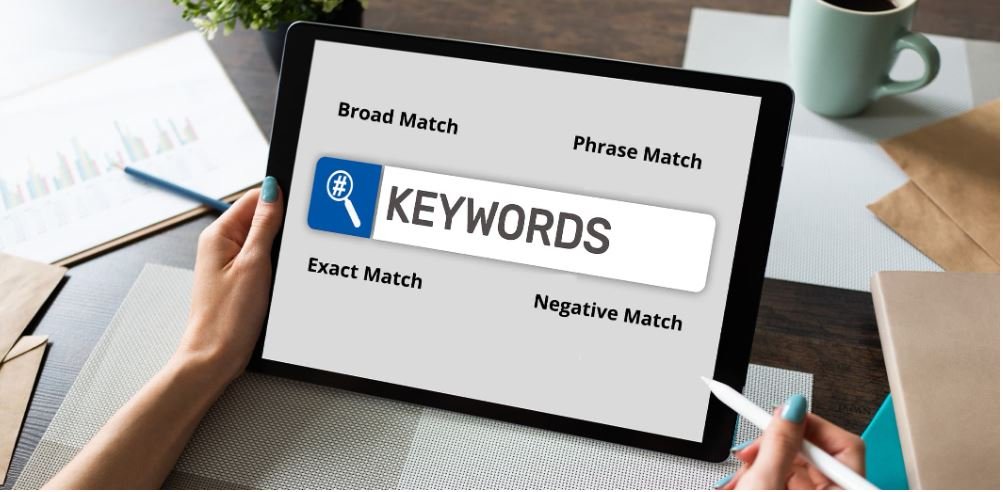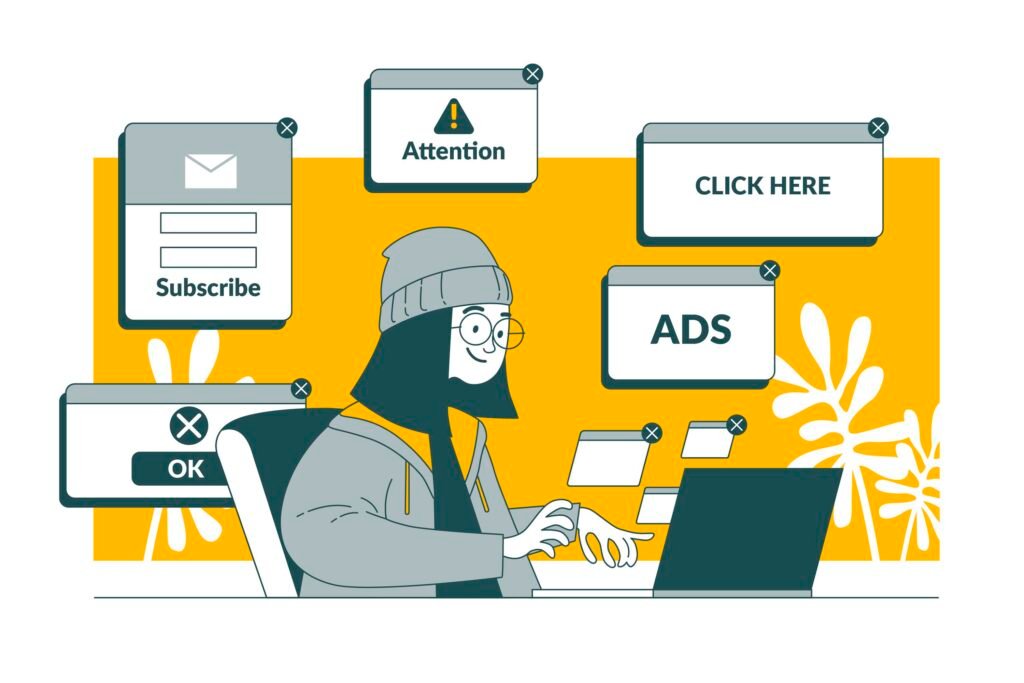Keyword Match Types: Google Ads PPC Guide for 2025

Introduction:
How do keyword match types impact your ad’s visibility in Google Search? What do they control? They control what search queries show your ad – they also control how far and how relevant your ads can be seen. There are three types of Keyword Match types. Those are called Broad Match, Phrase Match and Exact Match.
- Broad Match – Your ad can show for all variations of your keyword(s), even if it does not match the exact keyword(s).
- Phrase Match – The ad shows for any search that has the phrase(s) in the same order as the keyword(s).
- Exact Match – The ad shows for any search that has an exact match to the keyword(s) or a close variation of the exact keyword(s).
It is vital to know what keyword match types are in Google Ads, and how each match type can benefit you. So you can make better-informed decisions on what keywords to use and improve on your ROAS. When you use keywords wisely, you can be seen by more people, better-quality searchers and reduce waste on ad spend. Using these keyword is one of the most important components for effective and profitable Google Ads.
Broad Match Keywords
The broad match is the most flexible Google Ads keyword match type. The broad match permits your advertisements to visit a diverse array of related search queries. In contrast, exact and phrase matches target narrower search objectives. Google may associate your broad match keyword with synonyms. However, exact and phrase matches will only be associated with those exact keywords or phrases.
For example, an advertisement using the broad match keyword
“Bicycle repair,” could show for a search query such as “fix a bike,” “cycling repair shop,” or “bicycle repair.”
Broad match keywords are an excellent way to capture new customers and discover new keywords.
Pros of Broad Match Keywords:
- Broad Match keywords offer the largest audience reach
- Automatically discovers new variations of keywords
- Excellent for awareness, discovery, and testing phases of advertising.
Cons of Broad Match Keywords:
- Often results in matches to less relevant search queries
- Higher costs from less relevant clicks
- Requires careful monitoring and negative keywords to maintain quality traffic
When to Use Broad Match:
- When to discover new search patterns
- When you are using smart bidding (e.g., maximize conversions, target CPA)
- When you want a broad reach, and you’re okay with a small amount of irrelevant traffic
To be successful with broad keyword match type, you must regularly perform search term analysis. If managed properly, Broad Match will provide in increased audience reach while still being consistent with your targeting goals.
Phrase Match Keywords
The phrase match is a type of Google Ads keyword match type which offers flexibility in a campaign but keeps the user intent intact. The exact phrase, with no variation in order (including extra words), must be present in the search query for your ad to show.
For example:
The phrase match keyword
- “best running shoes” might trigger an advertiser’s ad for the searches,
- “buy best running shoes” or “best running shoes for kids”,
- but this keyword would NOT trigger ads in response to the search for “best price running shoes”.
Phrase match keywords provide advertisers with more control over search results than broad keyword match type while giving them the ability to generate relevant search variations.
Pros of Phrase Match Keywords:
- User intent is strong, predictable, and consistent with the intent of the searcher(s)
- Limited flexibility in having additional words on both sides of the core phrase
- More relevant clicks than broad match, leading to a higher click-through rate
- Potential for improved ad quality
Cons of Phrase Match Keywords:
- Less reach than broad match
- Requires continuous optimization and refinement over time
When to Use Phrase Match Keywords:
- Strong user intent is desired, but variations of the keyword are also desired
- If you desire leads, sales and high-quality traffic to your website
- When performing more advanced keyword research, refining keyword targeting is important
Phrase Match Keyword gives you the opportunity to achieve the highest level of precision and effectiveness with your advertising, while being able to reach a large pool of related searches, while being less restrictive than broad keyword match type.
Exact Match Keywords
Google Ads gives blogger and business owners the ability to use exact match keywords as a very specific keyword match type whenever a user’s search matches an exact phrase, or is similar enough in the intent of what they are looking for. This provides a very specific type of advertising and brings in buyers with the highest qualifications.
When using [men’s dress shirt] for the exact match keyword, you would receive a click for “dress shirt men’s” but not for “men’s casual shirt”. Advertisers can stay on top of what people want to buy based on intent, not words.
Exact match keywords will prevent advertisers from spending money on clicks that won’t generate leads, and provides advertisers with customers who know exactly what they want. Exact match keywords are often the best option for high intent conversion campaigns.
Pros of Exact Match Keywords:
- Superior targeting; extremely relevant
- Reduces irrelevant clicks and increases ad performance
- Higher conversion rates as intent is evident
- Stronger control over what search queries trigger an advertisement
Cons of Exact Match Keywords:
- Limited reach as a direct result of the exact match rule
- Some related searches may be missed
- Requires continuous oversight to ensure that campaign settings are appropriate (avoid over-restricting).
When you should use Exact Match Keywords:
High ROI or conversion focused campaign
Best for if you’re an advertiser trying to get the most out of each click.
Niche or specialized searches
This is the best option, when your audience is searching with very specific, narrow keywords.
To Protect Your Brand Keywords
The goal is to ensure that your ads show up when people search for your brand terms. By using exact match keywords, you can protect your brand’s search impressions from being taken over by competitors.
When using Exact Match keywords, you can use them as a primary component of your keyword match types and create a balance between reach and precision to drive more high-quality, cost-effective traffic to your ads.
Negative Keyword Match Types
Negative keywords are a significant tool within Google Ads that can be used to prevent your ads from appearing for irrelevant searches. Consequently, by blocking out unwanted searches, negative keywords allow advertisers to reduce the amount of their ad spend wasted and improve the quality of the traffic that is directed to their ads, resulting in improved overall ROI.
You can implement negative keywords via intelligent, broad, or exact match types, which will provide you with varying levels of control.
How Negative Keyword Match Types Work
Negative Broad Match:
- Your ad will not be displayed if the user performs a search using all of the negative keyword words, in any arrangement.
- An example of negative keyword: cheap running shoes
- An example of blocked search: men’s cheap running shoes.
Negative Phrase Match:
When somebody does a search using your negative keyword (or phrase) with other words, your ad will be blocked if that user is searching for the same phrase.
For example: If you have a negative keyword of photo booth rental,
Then any searches performed like “cheap photo booth rentals near me” will be blocked from seeing your ad.
Negative Exact Match:
When someone does a search using only the negative keyword (or phrase), your ad won’t be displayed for that search.
it will only be displayed when the user includes extra words with the exact negative keyword (or phrase).
For example: If you have a negative keyword of wedding DJ,
Your ad will not show for searches using wedding DJ;
However, your ad will show for searches using the phrase “best wedding DJ services”.
Why Negative Keywords Are Essential in Keyword Match Types
Negative keyword match types help advertisers to eliminate irrelevant traffic. By using negative keywords, advertisers can enhance the accuracy of their campaigns. They can improve the performance of their ads. By maximizing the advantages of negative keyword match types within their keyword match type strategy, advertisers will maximize their ability to reach a greater audience. It also generate a more cost-efficient return on their investment (ROI).
Benefits of Using Negative Keywords
- Reduces Trash Clicks
- Decreases Waste Spend on Ads
- Increases Return On Investment and Cost-Efficiency
- Refines Targeting to Provide Better Quality Traffic
- Focuses Campaign on Users with Real Intent
Managing Negative Keywords
- If you want to block all traffic from your ad at the account, campaign, or ad group level, apply negative keywords at that level.
- You should find irrelevant searches to place in your account to help eliminate waste of your ads for future use.
- Use keyword research tools or already created negative keyword lists to prevent the wasting of traffic not related to the ad.
Choosing the Right Combination of Keyword Match Types
Choosing the correct mixture of keyword match type combinations is one of the most effective ways to increase your Google Ad’s performance. Each match type will have a different impact on the way that your ad reaches users and allows for a mixture of reach, relevance and cost for your advertising efforts. There are three main strategies to choose from when selecting which match types to utilize:
Strategies for Mixing Keyword Match Types:
- Use broad match keywords as an initial step to gain exposure to more audiences as well as discover other variations of the keyword your customers may search for.
- Use phrase match keywords to ensure user intent is preserved while providing some level of flexibility for broad match keyword variations.
- Utilise exact match keywords so that you may target those customers with the highest intent on converting to your product or service.
- Use negative match types in order to eliminate irrelevant search traffic and thus eliminate wasted advertising clicks.
Align Your Keyword Match Strategy with Your Budget and Goals:
- If your budget is small or restrictive: Focus on using a higher mix of phrase match and exact match keywords.
- If you are running discovery and brand awareness marketing campaigns: Use broad match keywords combined with Smart Bid technology to maximise your reach.
- Ongoing optimisation: Regularly review your search term report and continually evaluate your match types and keyword combination type.
- Ensure that you are using negative match types aggressively in order to optimise ROI and reduce irrelevant search traffic.
Advertisers can build an efficient yet effective multi-keyword match-based marketing campaign using multiple keyword matches and keyword variation (aka long-tail keywords). When done correctly, this combination of match types will enable advertisers to find new audiences, provide relevancy for their ad campaigns; and spend their advertising budget efficiently.
Leveraging Keyword Variations and Long-Tail Keywords in Ads
When keyword match type strategies are combined with keyword variations and long-tail keywords, they provide more opportunity for advertisers to reach potential customers. In general, advertisers can extend their reach by using a combination of different variations and longer, more specific phrases in their keywords. Since long-tail keywords generally indicate a higher likelihood of intent, lower levels of competition, and a greater likelihood of conversion; they can be a very powerful addition to any PPC campaign strategy.
The group of keywords used and how the keywords within the grouping fit together allows advertisers to reach a wider audience while maintaining relevance and offering opportunities for increased performance through additional traffic.
Strategies to find and optimize keyword variations and long-tail keywords:
- Use various tools such as Google Keyword Planner, Ubersuggest, SEMrush to identify variations of seed keywords and find long-tail keywords
- Leverage your Search Terms Report to identify user-generated queries that can be incorporated as long-tail
- Group keywords together with similar themes in order to improve the likelihood of ad relevance, improving quality score, and enhancing the user experience
- Emphasize incorporating long-tail keywords into the body of the ads and on landing pages, thus providing a means to higher ad relevancy and increased likelihood of conversion
- Leverage Negative Keywords to resolve irrelevant keyword variations—this helps eliminate wasted pay-per-click ad dollars.
Long Tail Keywords are a type of keyword that targets a narrow and specific audience of people who want something very specific. Using these keywords is a great way to find out what your audience wants, increase your success rate and decrease your cost. These types of keywords will also increase your traffic quality from the people who are looking for the same product and service. To get maximum results from your PPC or Pay per Click advertising you should use all combinations of keywords in conjunction with the proper selection of match type to get the most effective use of them, increase your ROI and increase your overall PPC performance.
Keyword Match Types: Key to PPC and SEO Success
Keywords match types will not only help improve your PPC but will also help you target keywords effectively as part of your SEO strategy. Match types give you a way to manage and control when and what ads will be displayed to the customer based on the intent of their search. Additionally, keywords can be used more generally for organic rankings and help to improve the ranking of your site in search engines. On the other hand, combining PPC keywords with those used in SEO gives marketers more insight into how users perform their searches and also how conversions are made.
The PPC keyword data collected from all categories of keywords (broad, phrase, and exact match types) will expose the actual search phrases that users are entering into Google. This will allow marketers to identify and develop high impact long-tail keywords, trends and intent-based phrases to augment their SEO content strategies.
Benefits of integrating PPC and SEO keywords:
There are multiple benefits of merging PPC and SEO keywords, including:
- by analyzing PPC search queries you may discover new keywords to use in your SEO strategy
- you can use PPC match-type performance data to enhance your SEO targeting capabilities
- you will minimize ad spend that isn’t converting into sales and increase the relevance of your content for potential search ranking opportunities
- you will be able to quickly respond to shifts in user search behaviour and changing user intent trends
The combination of SEO and PPC is an incredibly synergistic strategy. Using the insights you gain from keyword match types to develop your SEO strategy enables you to effectively increase both your paid and organic visibility, producing a higher level of performance, increased ROI, and improved efficiency of your marketing efforts overall.
Conclusion:
To conclude, understanding and utilizing the keyword match types available to PPC advertisers is critical to the success of a given campaign. Additionally, by applying the different match types to your advertising efforts, you can create a strategy that both increases your access to searchers and enables you to effectively control the timing of when and where your advertisement appears.
To improve your business’s paid search performance AGTC can help you achieve a competitive edge. By optimizing Google Ads and managing keyword match types effectively, AGTC will ensure your ads are seen by people searching for exactly what you are offering. AGTC will give you the tools you need to take full advantage of the power of keyword match types and maximize your PPC campaign results.
FAQ
What types of keyword match types are available?
There are three primary keyword match types available through Google Ads: Broad Match, Phrase Match, and Exact Match. The type of match selected will determine how closely the user’s search must match yours in order for your ad to appear in that search.
What should I use as a default match type?
The default match type is Broad Match. Since this option provides the largest potential reach of your ad, many advertisers use it. However, advertisers may also choose to use either Phrase Match or Exact Match in order to control better the relevance of their campaigns.
How do negative keywords affect PPC campaigns?
Negative keywords are used to prevent your ads from appearing in irrelevant searches. By adding negative keywords, you will reduce wasted ad spend and create more accurate targeting.
Will keyword match types impact my Quality Score?
Yes. The more relevant xan ad is to the keyword, the greater impact it has on the Quality Score. One of the strongest influences on Quality Score is determined by the match type used.
Can switching match types reduce the cost of my ad?
Yes, switching to more narrow match types, or adding strong negative keywords, will reduce your irrelevant clicks and consequently lower the overall cost of your PPC campaigns.










